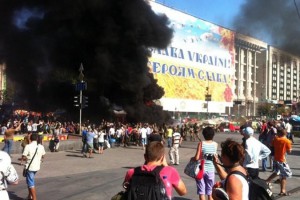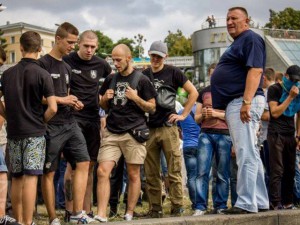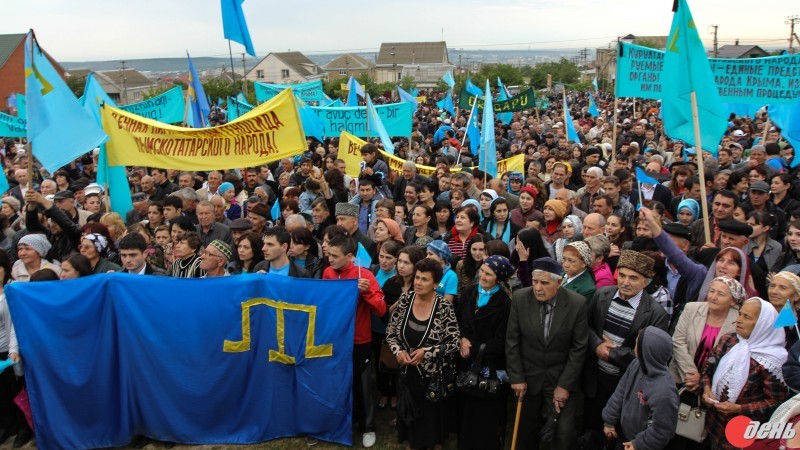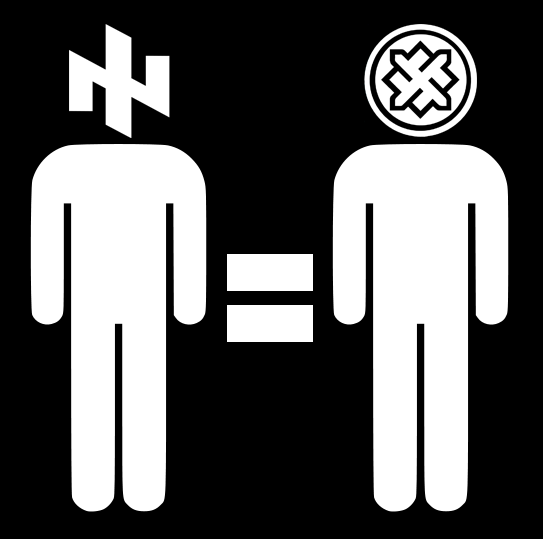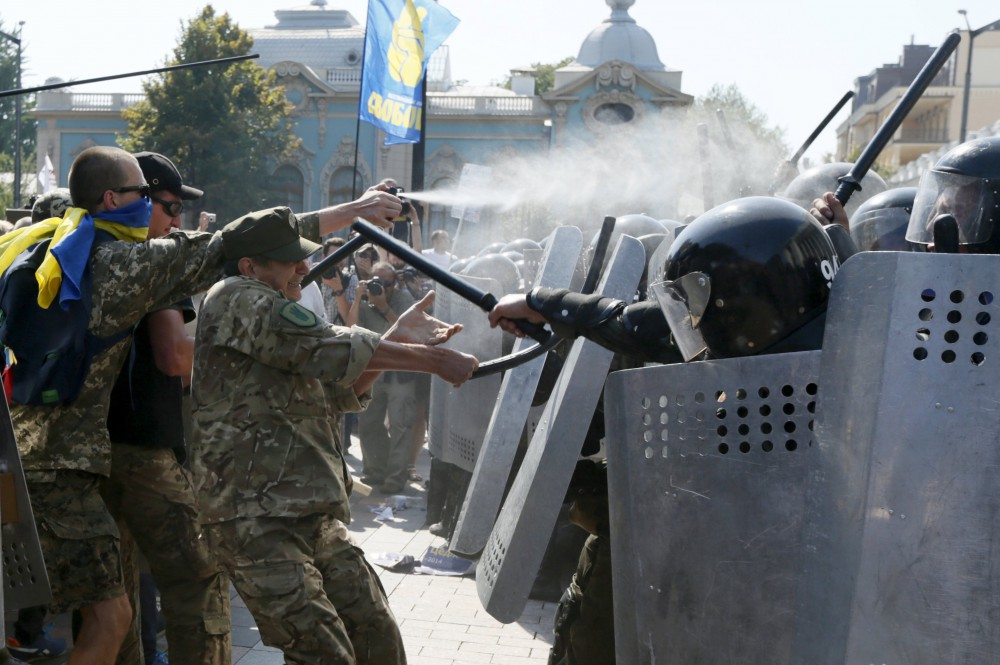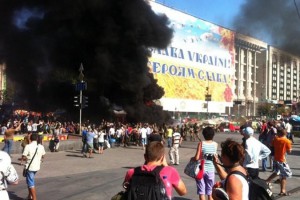 Новая власть, появившаяся благодаря Майдану, поступает совершенно логично и ожидаемо. Майдан сделал свой вклад в дело государственного переворота и оказался ненужным, когда правящий класс закрепил свои основные позиции в государственных структурах. Предыдущая власть делала все возможное, чтобы подавить возможность легального существования протестов, и новая закономерно перенимает эстафету в этом деле. Она возвращает авторитаризм образца режима Януковича и возобновляет попытку построить полицейское государство, которая и вызвала массовые протесты в прошлом году.
Новая власть, появившаяся благодаря Майдану, поступает совершенно логично и ожидаемо. Майдан сделал свой вклад в дело государственного переворота и оказался ненужным, когда правящий класс закрепил свои основные позиции в государственных структурах. Предыдущая власть делала все возможное, чтобы подавить возможность легального существования протестов, и новая закономерно перенимает эстафету в этом деле. Она возвращает авторитаризм образца режима Януковича и возобновляет попытку построить полицейское государство, которая и вызвала массовые протесты в прошлом году.
Мы можем обвинить Майдан, который так и не озвучил ни единого конкретного и решительного лозунга или требования, кроме “Януковича прочь”. Януковича при власти уже давно нет, но с тех пор никакой новой повестки дня не возникло. Политические силы, получившие власть в результате переворота, занялись разделом власти и оставили Майдан, который так и не смог сказать ничего нового без лидеров.
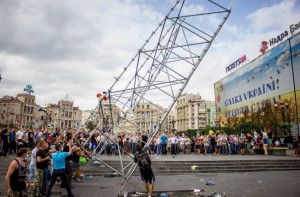 Майдан окончательно исчерпал себя как движение, и единственное, что он способен был противопоставить новой власти – это претензию, что она расправляется с “врагами Украины” недостаточно эффективно или жестко. Кроме актуальной повестки, на Майдане так и не возникли институциональные формы и структуры, которые действительно можно было бы назвать элементами “прямой демократии”. Вся “прямая демократия” заключалась в сакрализированном архаичном институте “Веча” – массовых собраниях, с которыми считались до тех пор, пока они были довольно многочисленными. При этом в вопросах внутреннего распорядка Майдана главенствовал самопровозглашенный “совет сотников”, который присвоил себе право контролировать все общественное пространство, вводить комендантский час или другие запреты и ограничения.
Майдан окончательно исчерпал себя как движение, и единственное, что он способен был противопоставить новой власти – это претензию, что она расправляется с “врагами Украины” недостаточно эффективно или жестко. Кроме актуальной повестки, на Майдане так и не возникли институциональные формы и структуры, которые действительно можно было бы назвать элементами “прямой демократии”. Вся “прямая демократия” заключалась в сакрализированном архаичном институте “Веча” – массовых собраниях, с которыми считались до тех пор, пока они были довольно многочисленными. При этом в вопросах внутреннего распорядка Майдана главенствовал самопровозглашенный “совет сотников”, который присвоил себе право контролировать все общественное пространство, вводить комендантский час или другие запреты и ограничения.
Мы в праве обвинить и посторонние факторы, в частности события в Крыму и на Востоке. Именно война на Донбассе поставила крест на всех надеждах на “социализацию” Майдана – вся его протестная энергия вылилась в ненависть к “сепаратистам”, Путину и российскому государству. Две главных претензии к Майдану со стороны “возмущенных киевлян” во время его разгона состояли в том, что майдановцы “до сих пор не на фронте”, а также, что все они “тунеядцы, бездельники, алкоголики и маргиналы”. Ура-патриотизм и воинственный социальны расизм (“зэка на нары”), взлелеяный на Майдане, бумерангом вернулся против него самого.
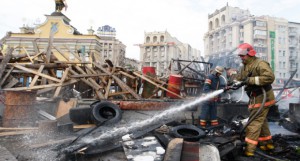 В силу перечисленных факторов также не сбылись рассчеты на то, что Майдан станет каким-то постоянно действующим институтом контроля за действиями власти и точкой быстрого разворачивания протестных действий в случае необходимости. Это стало ясно еще весной. На протяжении последних трех месяцев его общественные функции сводились к исполнению роли сборища “профессиональных революционеров”, армии свободных рук для рейдерских и других криминальных задач, Диснейленда для туристов и социального центра для любителей политизированного досуга.
В силу перечисленных факторов также не сбылись рассчеты на то, что Майдан станет каким-то постоянно действующим институтом контроля за действиями власти и точкой быстрого разворачивания протестных действий в случае необходимости. Это стало ясно еще весной. На протяжении последних трех месяцев его общественные функции сводились к исполнению роли сборища “профессиональных революционеров”, армии свободных рук для рейдерских и других криминальных задач, Диснейленда для туристов и социального центра для любителей политизированного досуга.
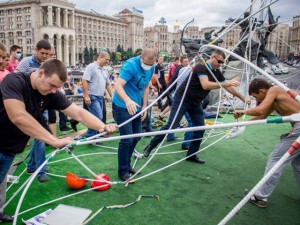 В то же время ясно, что социально-экономические противоречия, которые могли бы наделить Майдан классовым пролетарским характером, если бы он выжил как общественное движение, никуда не делись. Напротив, они будут лишь нарастать в силу объективных обстоятельств – жалкого состояния украинской экономики, подорожание жизни, бюджетных урезаний и бесстыдного грабежа бюджета под прикрытием войны. Со временем патриотический дурман будет рассеиваться и у трудящихся возникнут легитимные вопросы и претензии к “родному” правительству.
В то же время ясно, что социально-экономические противоречия, которые могли бы наделить Майдан классовым пролетарским характером, если бы он выжил как общественное движение, никуда не делись. Напротив, они будут лишь нарастать в силу объективных обстоятельств – жалкого состояния украинской экономики, подорожание жизни, бюджетных урезаний и бесстыдного грабежа бюджета под прикрытием войны. Со временем патриотический дурман будет рассеиваться и у трудящихся возникнут легитимные вопросы и претензии к “родному” правительству.
Нам пока что не известно, какую форму обретут эти будущие протесты. Конечно же, мы будем прилагать все усилия для того, чтобы на них громче звучали классовые и либертарные лозунги, но не собираемся обманываться и рассчитывать на Правильную Социальную Революцию™. Националистические настроения никуда не исчезнут полностью и, скорее всего, будут важным элементом протестов даже против нового украинского правительства. Нам снова придется работать в атмосфере политической вражды и искать новые методы игатации и убеждения, которых сильно не хватало во время событий Майдана.
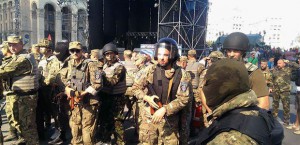 Примечательно, что во время разгона милиции помогали батальоны “Киев-1” и “Киев-2”, в составе которых числятся активисты ультраправой партии ВО “Свобода”, бывшими активными участниками и защитниками Майдана. Когда Майдан перестал удовлетворять их стремления к власти, они совершенно естественно перешли на сторону власти, да еще и в состав милиции, с которой решительно и “принципиально” воевали раньше. То же самое можно сказать и про другие ультраправые движения (“Нарния” и др.), чьи представители активно помагают городской власти ликвидировать остатки собственной “колыбели”. Разные ультраправые будут отыгрывать важную роль в будущих столкновениях как со стороны власти, так и со стороны протеста. Наша задача – противопоставить и тем, и другим собственную повестку и способствовать обустройству радикального рабочего движения.
Примечательно, что во время разгона милиции помогали батальоны “Киев-1” и “Киев-2”, в составе которых числятся активисты ультраправой партии ВО “Свобода”, бывшими активными участниками и защитниками Майдана. Когда Майдан перестал удовлетворять их стремления к власти, они совершенно естественно перешли на сторону власти, да еще и в состав милиции, с которой решительно и “принципиально” воевали раньше. То же самое можно сказать и про другие ультраправые движения (“Нарния” и др.), чьи представители активно помагают городской власти ликвидировать остатки собственной “колыбели”. Разные ультраправые будут отыгрывать важную роль в будущих столкновениях как со стороны власти, так и со стороны протеста. Наша задача – противопоставить и тем, и другим собственную повестку и способствовать обустройству радикального рабочего движения.
Statement of AWU-Kiev on Maidan disbandment by the new government
 The new government, owing its appearance to Maidan events, acts quite as expected and in a logical way. Maidan had contributed to the overthrow of the old regime and was deemed unnecessary afterwards, when the ruling class consolidated their position in the state bureaucracy. The previous government was doing its best to deny every possibility of legal protest, and the new one naturally takes up the baton. Post-Maidan authorities steer their course to Yanukovych-like authoritarianism and repeat the same attempts of building a police state, that sparked mass protests last year.
The new government, owing its appearance to Maidan events, acts quite as expected and in a logical way. Maidan had contributed to the overthrow of the old regime and was deemed unnecessary afterwards, when the ruling class consolidated their position in the state bureaucracy. The previous government was doing its best to deny every possibility of legal protest, and the new one naturally takes up the baton. Post-Maidan authorities steer their course to Yanukovych-like authoritarianism and repeat the same attempts of building a police state, that sparked mass protests last year.
We can put a blame on Maidan itself, which announced no specific and decisive slogans or demands other than “down with Yanukovych”. The old president had gone a long time ago, but no new agenda was articulated since then. Political forces that had come to power after the overthrow, engaged in the fight for power and left Maidan alone, and the latter was not able to find its voice anew without the old leaders.
 Social movement of Maidan completely exhausted itself, and the only reproach it was able to throw against the new government was timidity in dealing with the “enemies of Ukraine”. Similarly to any up-to-date agenda, Maidan lacked the attempts to build institutes and structures that could have been characterised as elements of direct democracy. The sole sacralized feature of “direct democracy” was the archaic practice of “Viche” — the mass assembly of people on the square, shouting their approval or disapproval of things being proclaimed from the stage — and that “Viches” were taken into account only as long as they had been really numerous. And furthermore, there was the self-proclaimed “commanders council” of Maidan that claimed to keep the internal order and assumed the right to control public space, impose curfews as well as other restrictions and limitations on the area under Maidan’s influence.
Social movement of Maidan completely exhausted itself, and the only reproach it was able to throw against the new government was timidity in dealing with the “enemies of Ukraine”. Similarly to any up-to-date agenda, Maidan lacked the attempts to build institutes and structures that could have been characterised as elements of direct democracy. The sole sacralized feature of “direct democracy” was the archaic practice of “Viche” — the mass assembly of people on the square, shouting their approval or disapproval of things being proclaimed from the stage — and that “Viches” were taken into account only as long as they had been really numerous. And furthermore, there was the self-proclaimed “commanders council” of Maidan that claimed to keep the internal order and assumed the right to control public space, impose curfews as well as other restrictions and limitations on the area under Maidan’s influence.
We might also place responsibility on external factors, namely the events in Crimea and in the East. It was the Donbas war that put an end to all hopes of Maidan adopting social agenda — the entire protest energy of the latter only fueled the people’s hatred of the “separatists”, Russian state and Putin personally. The “indignant people of Kiev”, gathered to support the Maidan’s disbandment, raised two concerns — that is, Maidan activists were “still not at the front”, and moreover they were “parasites, bums, alcoholics and marginalized people”. Jingoism and militant social racism (remember “zeka na nary”, i.e. “convict /Yanukovich/ — back to jail!”), which was nurtured on Maidan, now backfired against it.
 In light of all the aforementioned factors, did not come to life the forecasts of Maidan becoming some kind of permanent institution of civic control over the authorities, neither the hopes of it being a convenient startup point for future protests. The failures of these predictions were apparent by the end of the spring. Over the last three months, Maidan’s public functions were reduced to being the coven of “professional revolutionaries”, as well as contributing free hands and other means for raiding businesses and other shady tasks, playing the role of Disneyland for tourists and providing entertainment for politicized leisure amateurs.
In light of all the aforementioned factors, did not come to life the forecasts of Maidan becoming some kind of permanent institution of civic control over the authorities, neither the hopes of it being a convenient startup point for future protests. The failures of these predictions were apparent by the end of the spring. Over the last three months, Maidan’s public functions were reduced to being the coven of “professional revolutionaries”, as well as contributing free hands and other means for raiding businesses and other shady tasks, playing the role of Disneyland for tourists and providing entertainment for politicized leisure amateurs.
 At the same time it is clear that the socio-economic predicament that might had supplied Maidan (if it had survived as a social movement) with the proletarian background, did not go away. On the contrary, the crisis will only grow worse due to actual circumstances — price hikes, social cuts, the shameless budget extortions under the guise of war, and the overall miserable state the economy finds itself in. Over time, the patriotic intoxication will wear off and workers would raise legitimate questions and demands to the “dear” government.
At the same time it is clear that the socio-economic predicament that might had supplied Maidan (if it had survived as a social movement) with the proletarian background, did not go away. On the contrary, the crisis will only grow worse due to actual circumstances — price hikes, social cuts, the shameless budget extortions under the guise of war, and the overall miserable state the economy finds itself in. Over time, the patriotic intoxication will wear off and workers would raise legitimate questions and demands to the “dear” government.
We still do not know what shape the future protests would take. Of course, we will do our best to ensure that class agenda and libertarian slogans reach as many ears as possible, but let’s not have the hope of the True Social Revolution™ deceive us. Nationalist sentiment will not have disappeared completely, and most likely it will still be an important element of mass protest, even against the incumbent government. Once again, we will have to work in an atmosphere of political hostility and seek new agitation and persuasion methods, the ones we severely lacked during the events of the Maidan.
 It is noteworthy that battalions “Kyiv-1” and “Kyiv-2”, comprised of far-right “Svoboda” party activists, which were the former participants and defenders of Maidan, actively helped the police forces to disperse Maidan. When Maidan was no longer able to satisfy their desire for power, they quite naturally sided with the government — and even with the police, which they resolutely and “fundamentally” opposed before. The same can be said about the other extreme right groups (“Narnia” and others), whose representatives supported the city authorities in eliminating the remnants of their own “cradle”. Diverse far-right gangs will take an important part in future confrontations, probably on both sides — for the government and for the protest. It will be our responsibility to oppose them no matter which side they are on, promote our own agenda and contribute to the development of radical workers’ movement.
It is noteworthy that battalions “Kyiv-1” and “Kyiv-2”, comprised of far-right “Svoboda” party activists, which were the former participants and defenders of Maidan, actively helped the police forces to disperse Maidan. When Maidan was no longer able to satisfy their desire for power, they quite naturally sided with the government — and even with the police, which they resolutely and “fundamentally” opposed before. The same can be said about the other extreme right groups (“Narnia” and others), whose representatives supported the city authorities in eliminating the remnants of their own “cradle”. Diverse far-right gangs will take an important part in future confrontations, probably on both sides — for the government and for the protest. It will be our responsibility to oppose them no matter which side they are on, promote our own agenda and contribute to the development of radical workers’ movement.

